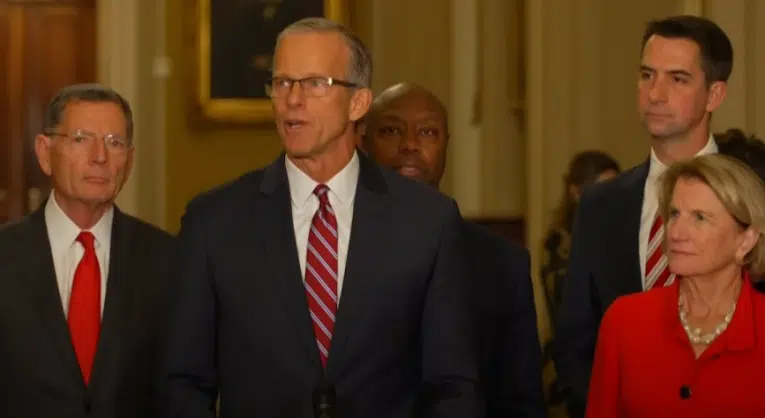
A group of 19 Republican Attorneys General led by Arizona Attorney General Mark Brnovich and Nebraska Attorney General Doug Peterson have threatened the $10 trillion hedge fund BlackRock with antitrust legal action in an Aug. 4 letter to BlackRock CEO Larry Fink accusing the company of “intentionally restrain[ing] and harm[ing] the competitiveness of the energy markets” with its market dominance of retirement investments.
Brnovich and Peterson added, “coordinated conduct with other financial institutions to impose net-zero [carbon emissions by 2050] … raises antitrust concerns. Group boycotts, restraining trade, or concerted refusals to deal, ‘clearly run afoul of’ Section 1 of the Sherman Act [according to the Supreme Court]. Section 1 prohibits ‘[e]very … combination … , or conspiracy, in restraint of trade or commerce.’ Regarding the definition of a ‘combination,’ the Supreme Court has held that this language prohibits ‘concerted action.’”
Those are fighting words. Here, Brnovich, Peterson and the other GOP Attorneys General lay out a case that BlackRock’s push for net zero carbon emissions, through its coordinated efforts with investment banks via Environmental, Social and Governance (ESG) funds to restrict the flow of capital to carbon-based energies like oil and coal, are engaged in a type of anticompetitive collusion prohibited by federal antitrust laws.
ESG investing has increased dramatically in the past two decades via private retirement funds regulated under the Employment Retirement Income Security Act (ERISA) thanks to a regulation by the Obama Labor Department in 2015 allowing ESG investments into tax-exempt retirement savings accounts, and also by individually directed tax-free retirement accounts. A 2020 regulation by the Trump administration to water that down was promptly overturned by the Biden Administration.
In addition, the $762 billion federal Thrift Savings Plan (TSP) for federal employee retirees began investing in ESG funds in 2022, following state government employee retirement funds in California, New York, Colorado, Connecticut, Maine, Maryland and Oregon.
As a result, ESG is said to be worth $41 trillion this year globally, and $50 trillion by 2025, about one-third of all assets under management, according to Bloomberg.
U.S. corporations appear to be all in on BlackRock’s investing scam, with a recent KPMG survey finding 82 percent of U.S. corporations are touting ESG sustainability goals in their corporate filings. I’d add, even though doing so by no means guarantees inclusion in hedge funds’ ESG funds like BlackRock, Vanguard, etc.
In other words, ESG investing is so successful in shifting companies to the stakeholder capitalism model that companies are adopting ESG goals of their own accord — in mere hopes of getting some that investment money by virtue signaling — without necessarily even boosting their companies’ capitalization. It’s like trying to boost your odds of winning the lottery by promoting the lottery. It doesn’t quite work that way.
In the meantime, Brnovich and Peterson are absolutely correct that BlackRock’s ESG-driven focus on net zero carbon is absolutely strangling U.S. energy production through pressure on corporate firms.
According to EIA, U.S. oil production will reach 12 million barrels per day in 2022 and 12.6 million barrels per day in 2023, not quite a return to pre-Covid production levels that peaked at 12.9 million barrels per day in Nov. 2019. Why? Because America’s largest energy companies appear to be purposely unprepared to expand production even in the middle of a global energy shortage. The proper investments were never made.
ExxonMobil, the largest producer in the U.S., announced that it would produce about 3.7 million barrels of oil a day — about 18 percent of all U.S. consumption — from its facilities throughout the world, a level which would remain relatively unchanged through 2025. This year, the estimate for 2022 was up slightly to 3.8 million barrels a day, only expected to rise to 4.2 million barrels a day by 2027.
Chevron, the second largest U.S.-based producer, it currently produces about 3 million barrels a day, expected to rise by just 500,000 barrels per day by 2025 to 3.5 million barrels per day.
In the meantime, carbon-based energy companies will pretend to feud with green companies or the Biden administration about “greenwashing” in these companies’ investment brochures, all the while helping BlackRock to achieve its utopian, net zero carbon goals — simply by slowing down production.
BlackRock has placed green activists onto the board of Exxon to make it a “not-oil” company, thanks to ESG. Other hedge funds like Vanguard also make significant ESG investments.
But it has led to catastrophe. Besides making Europe and the West increasingly dependent on energy from adversaries like Russia, inflation is on fire. Thanks to the energy crisis, even major ESG beneficiaries like Tesla CEO Elon Musk are calling for an increase in oil and gas production in a bid to offset Russia, writing on Twitter on March 8: “Hate to say it, but we need to increase oil & gas output immediately. Extraordinary times demand extraordinary measures.” And yet, we’re not increasing production by all that much.
In his annual shareholder letter to investors BlackRock CEO Larry Fink said the war in Ukraine, the supply crisis and the inflation would all lead to even more green energy in the future: “Longer-term, I believe that recent events will actually accelerate the shift toward greener sources of energy in many parts of the world.” Particularly, the inflation of carbon-based energy would make green energy more price competitive: “Higher energy prices will also meaningfully reduce the green premium for clean technologies and enable renewables, EVs and other clean technologies to be much more competitive economically,” Fink said.
In other words, the inflation we’re all experiencing right now is the point.
Indeed, extraordinary times do call for extraordinary measures, as Elon Musk has suggested — and thank goodness Attorneys General Brnovich and Peterson are taking the lead for red states via antitrust action. Ultimately, it is Congress with its power to regulate interstate commerce and the power of the purse to state which types of investments are eligible for tax-free status that could bring ESG and other economically targeted investments to their knees.
The goal for Republicans, whether in the states or in Congress, has to be to boost energy production here and to free our capital system from the grips of those who would use it to weaken America’s position in the world. Whatever it takes, there is too much at stake.
Robert Romano is the Vice President of Public Policy at Americans for Limited Government.






